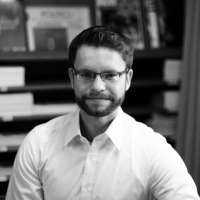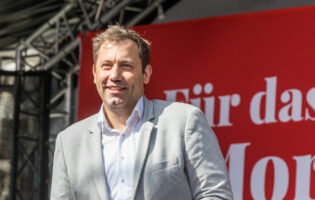
Olaf Kosinsky via Wikimedia Commons
Germany’s Christian Democrats

Matthias Dilling
Swansea University
Matthias Dilling (Ph.D. Oxford, 2017) is a Lecturer (Assistant Professor) in Politics at Swansea University and an associate member of Oxford University’s Department of Politics in IR. He previously was a Lecturer at Oxford University and Oxford University’s Pembroke College and a visiting researcher at Yale University and the University of Vienna. His sole- and co-authored work on political parties and institutional development has been published or is forthcoming in Political Research Quarterly, Social Science History, German Politics and Society, and edited volumes.
What (Not) to Expect from Friedrich Merz’s Leadership
Friedrich Merz is the new leader of Germany’s Christian Democratic Union (CDU). Four months after the Christian Democrats’ historic defeat in the 2021 German election, the delegates to the virtual party congress confirmed the 66-year-old lawyer as their new leader. As expected, the delegates followed the clear result of the party membership vote that took place in December. For the first time in the party’s history, CDU members had been invited to express their views on a leadership contest, with the social and economic conservative Merz defeating progressive Norbert Röttgen and centrist Helge Braun. Set to also assume the leadership of the Christian Democrats’ caucus in the Bundestag, Friedrich Merz will have considerable influence over shaping the future of a party that seems exhausted and ideologically diluted after sixteen continuous years in office. What does Merz’s election mean for Germany’s Christian Democrats? While the CDU has reinvented itself several times during its history, it remains to be seen whether Merz will be the right leader to revive and unite the party. However, there are some expectations associated with his election that we can reject with some level of confidence.
- Merz’s election does not mean the CDU’s return to its ideological roots. Over the last several years, CDU conservatives have increasingly criticized the leadership of Angela Merkel and her centrist successors, accusing them of eroding the party brand and painting the picture of a party that had lost its foundational values and ideals. Against popular belief, Merz’s election is not a return to this ideological foundation. While economic and social conservatism have indeed been important pillars of the CDU since its formation in 1950, the party also included a pronounced social-Catholic tradition, which, albeit weakened, remained influential in shaping a social market economy and Germany’s welfare state well until the late 1990s. Merz called for a radical departure from this social-Catholic and economically balanced tradition when rising to prominence in the late 1990s and early 2000s (interestingly after the party had just lost power following another sixteen-year long tenure). Even though Merz was no longer parliamentary party leader by the time the CDU passed its 2003 Leipzig manifesto, his free-market course had importantly inspired its content, which observers rightly characterized as a sign of “upheaval” and “not continuity.” Merz’s election as party leader might thus mean the rebound of ideas from the turn of the century but certainly not a return to the party’s ideological foundations.
- Merz’s free-market course only gave the CDU a temporary boost in the past, and it is unlikely to be a mobilizing factor for voters now. With the free-market turn in the early 2000s, the Christian Democrats rose in the polls—at times having a 27-percent lead over the governing Social Democrats—and celebrated a number of important victories in regional elections. However, public reservations soon grew, and the 2005 election result, while allowing the Christian Democrats to reclaim the chancellorship, was a disappointment, leading to the party abandoning its radical economic program. What is this telling us for today? It is plausible that the Christian Democrats will improve in the polls. With the market-liberal FDP now being in government with two left-leaning parties, it seems likely that Merz will succeed in regaining some voters previously lost to the FDP. However, the political truism that German elections “are won in the center” (Wahlen werden in der Mitte gewonnen) has not lost much of its significance and should be a warning to anybody expecting a phoenix-like rise of a market-liberal CDU.
- Finally, we should be skeptical toward expecting a potential right-wing shift under Merz to help the CDU regain many of the voters previously lost to the far-right AfD. There is ongoing uncertainty over what a Merz-CDU will actually look like. Recent statements suggest that the party might not shift as far to the right as many expected. However, since his political comeback in 2018, Merz moved beyond his previous emphasis on economic conservatism and was at the center of controversies over statements he made about immigration, homosexuality, and the CDU’s establishment. For many CDU conservatives, who remember fondly the CDU’s previously restrictive positions on immigration and cultural identity, this is the way to push back the AfD and honor Franz-Josef Strauss’ call that “no legitimate political party” can be right of the Christian Democrats. However, scholarly evidence suggests that the AfD is not merely flesh of the flesh of the CDU, whose religious roots have demarcated it from the AfD. Moreover, after eight years, the AfD has become a part of the German party system, and its voters have started displaying signs of party identity. A recent study suggests that while a dramatic shift to the right might help the CDU to recapture some of these voters, this would likely come at the cost of even higher losses at the center.
Thus, while it is impossible to predict with certainty what Merz’s election as party leader will mean for Germany’s Christian Democrats, he will have to formulate a vision to unite and revive the party that goes beyond his previously expressed economic and social conservatism. A return to the past is only very rarely a promising recipe for the future.









